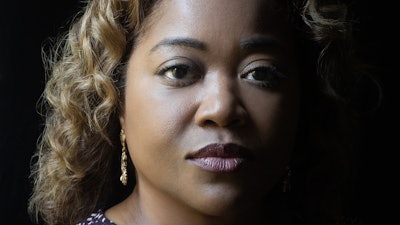Dr. DaMaris B. Hill has been writing since she was a child, growing up around books and hearing stories. She just didn’t tell anyone about it. Instead, she stuffed her work underneath her mattress and bed, hiding them from others.
 Dr. DaMaris B. HillCourtesy: Beowulf Sheehan
Dr. DaMaris B. HillCourtesy: Beowulf Sheehan
Hill – currently a full professor of creative writing, English, and African American studies at the University of Kentucky (UK) – wrote her first story while pursuing her master’s degree in English in the early 2000s. On the Other Side of Heaven – 1957, a fiction piece, received recognition and praise and was later reprinted in the journal Reverie: Midwest African American Literature, in 2011.
“The prose was in English, and the dialogue was in Spanish. And apparently, I didn't know that that was innovative,” Hill says. “It just made sense to me. . . People speak Spanish in this setting."
Her scholarly interests encompass topics surrounding the experience of Black women, such as the erasure of contributions, identity in digital spaces, cultural and collective memory, and mass incarceration.
“I’m very concerned about the ways that the contributions of Black women are erased or understated in the texture and fabric of national narratives but also geopolitical concepts of power,” Hill told Diverse. “I am interested in the way that we preserve, memorialize, and remember the experiences of Black women. But I'm also interested in the ways that Black women's contributions are purposefully and systematically erased from the archival and digital environments."
In her 2019 poetry collection, A Bound Woman Is a Dangerous Thing: The Incarceration of African American Women from Harriet Tubman to Sandra Bland, Hill expresses her concerns about Black women in confinement. For her groundbreaking work, she earned a nomination for an NAACP Image Award as well as several other commendations. And the very existence of her book itself made her the first American poet and second poet ever to be published by Bloomsbury Publishing house.
“I appreciated the book's critical engagement with archival documents and photographs in the creation of a Black feminist poetics,” says Dr. Saidiya Hartman, professor of English and comparative literature at Columbia University.
Through her 2022 poetry book, Breath Better Spent: Living Black Girlhood, Hill explores a theme that has proven to be central for her: becoming.
Hill finds herself often interested in the ways things develop, change, and “become,” whether it is evolving forms of writing and expression, communities’ effects on adulthood, how Black girlhood influences the behavior of Black adult women, or how cultures are cultivated in digital spaces, she says.
Hill’s fascination with digital mediums carries over to her artistic endeavors, too, as she has sampled digital archival materials in her art-making process, she says. On her website, she features Shut Up In My Bones: The Remix, a work that incorporates poetry, recordings, and photographs to deliver its message. She has been working on a non-fiction piece about the early Americas and the deportation and importation of people during the time, she says. Hill’s own mother is from Bermuda, and Native Americans from New England colonies who were sold into slavery there could be her ancestors, she says.
“I'm interested in the narratives that were used to justify the deportation and importation of people that are my ancestors in this mythmaking of America,” Hill says. “I'm interested in the ways that we embrace these stories as a part of historical accuracy and national narratives. And then I'm interested in complicating them with the other truths of American history.”
In her youth, Hill was surrounded by stories, folklore, mythologies, and poetry. And having grown up in the education-oriented African Methodist Episcopal Church, learning and the Bible played prominent roles in her own ‘becoming’ as a writer.
“As a child, most people in my family [were] Methodist ministers,” Hill says. “The first book I knew was the Bible, and probably my first orientation to stories comes from an interpretative place.”
Entering higher ed and academia, she went on to earn a B.A. and M.A. in English from Morgan State, then a Ph.D. in English and creative writing from the University of Kansas.
Hill is a fellow and scholar-in-residence at Harvard’s Hutchins Center for African & African American Research. In 2022, she was a visiting fellow in race and ethnicity at Brown University’s Center for the Study of Race and Ethnicity in America.
Renowned poet Lucille Clifton’s influence is apparent in Hill’s work, says Hartman, adding that Hill stands as part of a generation of younger writers drawing influence and reference far and wide.
“The disciplines that I engage in are creative writing, English literature, women studies, African American literature, and digital studies,” Hill says “And I don't do them exclusively in disciplinary boundaries. Often times, I have them all come together in an intersectional way that reflects my intersectional identity and my refusal to be understood as one thing."





















